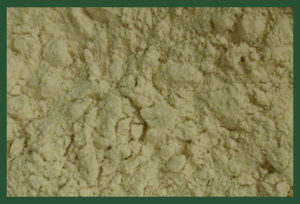Animal plasma is a unique protein source that provides functional proteins. These functional proteins contain biologically active albumin and globulin proteins. They also contain immunoglobulins such as IgG which are important antibodies that circulate in plasma. It is a highly soluble, high quality protein source with an amino acid profile and nutritive value comparable to nonfat dried (skim) milk and casein.

Spray Dried Animal Plasma (NutraPro B, from APC) photo credit: Dave Wood, Animix
Animal plasma first appeared in commercial calf milk replacers over 20 years ago. Today, about one third of all calf milk replacers made in the United States contain plasma. Large calf ranches are the major users of animal plasma milk replacers. Calves are co-mingled and often have not received adequate colostrum. These operations recognize the advantage of plasma from a health perspective and also receive a cost savings. Animal plasma is often fed in conjunction with hydrolyzed wheat protein in calf milk replacers to provide the benefits of plasma at a more significant cost savings.
Animal Plasma In the Digestive Tract
In addition to being an excellent source of nutrition for young calves, plasma has beneficial effects in the digestive tract. During the first two weeks of life, the calf secretes a portion of the immunoglobulins it absorbed from colostrum back into its digestive tract. The more colostrum absorbed, the more immunoglobulins secreted. This recycling of immunoglobulins helps protect the calf against pathogens. Providing animal plasma in milk replacer increases immunoglobulin levels in the digestive tract, and provides an ongoing source after the calf has stopped secreting immunoglobulins from its own bloodstream.
Research with both young calves and baby pigs demonstrates that feeding animal plasma has a direct effect on the integrity and function of the small intestine. Animal plasma may directly affect antigen growth and attachment in the small intestine, affecting intestinal growth and improving its barrier function.
Calf Performance
Over 30 trials have been conducted to evaluate the effects of animal plasma on the growth and performance of baby calves. In these trials, plasma always performed as well as or better than all-milk protein milk replacers. Improvements include:
- Fewer, shorter scour episodes
- Reduced medical costs
- Better gain
- More starter intake
- Lower cost than all-milk protein milk replacers
Product Characteristics
- 78% protein, 0.3% fat, 0.5% fiber, 7% moisture, 8.5% ash
- Light tan color that does not change the color, aroma or solubility of the milk replacer
